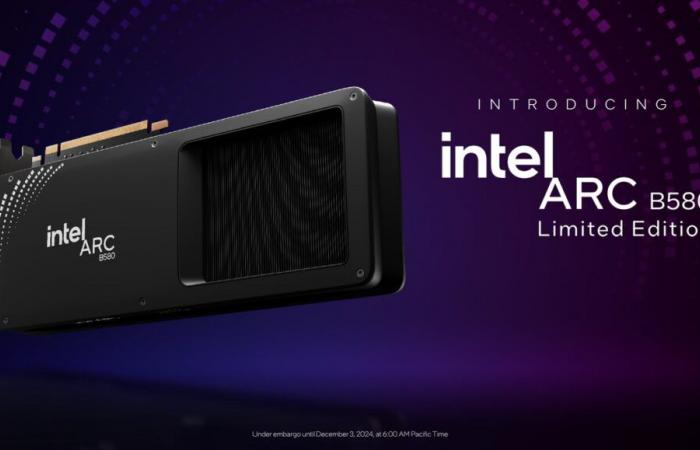Intel Arc B570
Introductory price €249
In the absence of offers discover
See more offers
The links shown above may not work if an ad blocker is used.
Intel Arc B580
Introductory price €285
In the absence of offers discover
See more offers
The links shown above may not work if an ad blocker is used.
The latest rumors announced the end of graphics cards at Intel after a first iteration, let's say timid. This is not the case and Intel is rolling out its roadmap with its second generation of Intel Arc graphics cards based on the Battlemage architecture.
Intel XeSS2
enlarge
To design this architecture, Intel specifically targeted users of screens with a definition of 2560 x 1440 px known as WQHD, with Full HD slowly beginning to decline. And to achieve this, Intel intends to support all the latest technologies including the very demanding ray-traced rendering thanks to the introduction of the second generation of scaling: Intel XeSS2.
Advertising, your content continues below
XeSS2 integrates: scaling, frame generation and latency reduction.
© Intel
On the XeSS2 program, scaling which consists of rendering a scene in a definition lower than the native definition of the screen then generating the image at the native definition using AI. New for this second iteration, the generation of frames which, for its part, creates an image from the previous one by anticipating movements and to reduce the latency introduced by this generation of images, Intel applies the equivalent of Reflex from Nvidia.
10 games at the moment support Intel XeSS2.
© Intel
Battlemage G21
Inside the Arc B580, we find a Battlemage G21 GPU carrying no less than 20 Xe units and as many units dedicated to Ray-tracing. Everything is accompanied by 12 GB of GDDR6 video memory on a 192-bit bus.
Advertising, your content continues below
Intel thus announces a gain of 70% in performance per Xe core compared to the previous generation and an efficiency gain (perf/watt) of 50%.
Intel announces a generational gain of 70%.
© Intel
Two graphics cards share the Battlemage GPU, the Arc B580 and the Arc B570, reduced by two Xe units and 2 GB of video memory.
The Intel Arc B580 will be available from December 13.
© Intel
Improved drivers
New options are appearing in the drivers including overclocking.
© Intel
Intel has also improved its drivers with the introduction of new display settings, an FPS limit setting or the arrival of overclocking. It is now possible to increase the frequency of the GPU and memory, adjust the voltage by offset or play with the ventilation curve, not to mention the possibility of increasing the power limit.
The GeForce RTX 4060 beaten
Performance compared to the previous model, the Arc A750 at 1440p.
© Intel
In practice, Intel announces that it will beat Nvidia's GeForce RTX 4060 both in terms of performance with or without ray-tracing in WQHD but also in terms of price since the Arc B580 is priced at $250 compared to $299 for the Nvidia card.
Performance against Nvidia's GeForce RTX 4060 in 1440p.
© Intel
The most critical will say that the GeForce RTX 4060 is at the end of its life since the arrival of the GeForce RTX 50 series is imminent, while the most optimistic will salute the performance which, if proven, would allow for a real battle under the 300 euro mark.
Advertising, your content continues below
According to Intel, updating from a GTX 1660 to an Arc 580 is beneficial!
© Intel
Because the bulk of sales are precisely in this segment below 300 euros as evidenced by the Steam statistics which see in less than November 2024 the GeForce RTX 3060 in the lead with 5% market share followed by the GeForce RTX 4060 with almost 4%. Intel would especially like to convince GTX 1650 and GTX 1660 users who represent more than 6% of gamers to upgrade to the Intel Arc B580.
An attractive performance/price investment
The performance/price ratio is in favor of the Intel model.
© Intel
With these Battlemage graphics cards, Intel could well create a surprise and restore some dynamism in a sector dominated by Nvidia (80% market share). The Arc B580 seems perfectly equipped to compete with the GeForce RTX 4060 or AMD's Radeon RX 7600. Let's hope that the pilots follow to allow them to make the test a reality.
The Arc B580 will be available on December 13 in France from $250, normally 285 euros VAT included, the Arc B570 will be available on January 25 at $219, or €249. Nvidia and AMD should quickly react by adjusting the price of their model.
Advertising, your content continues below






